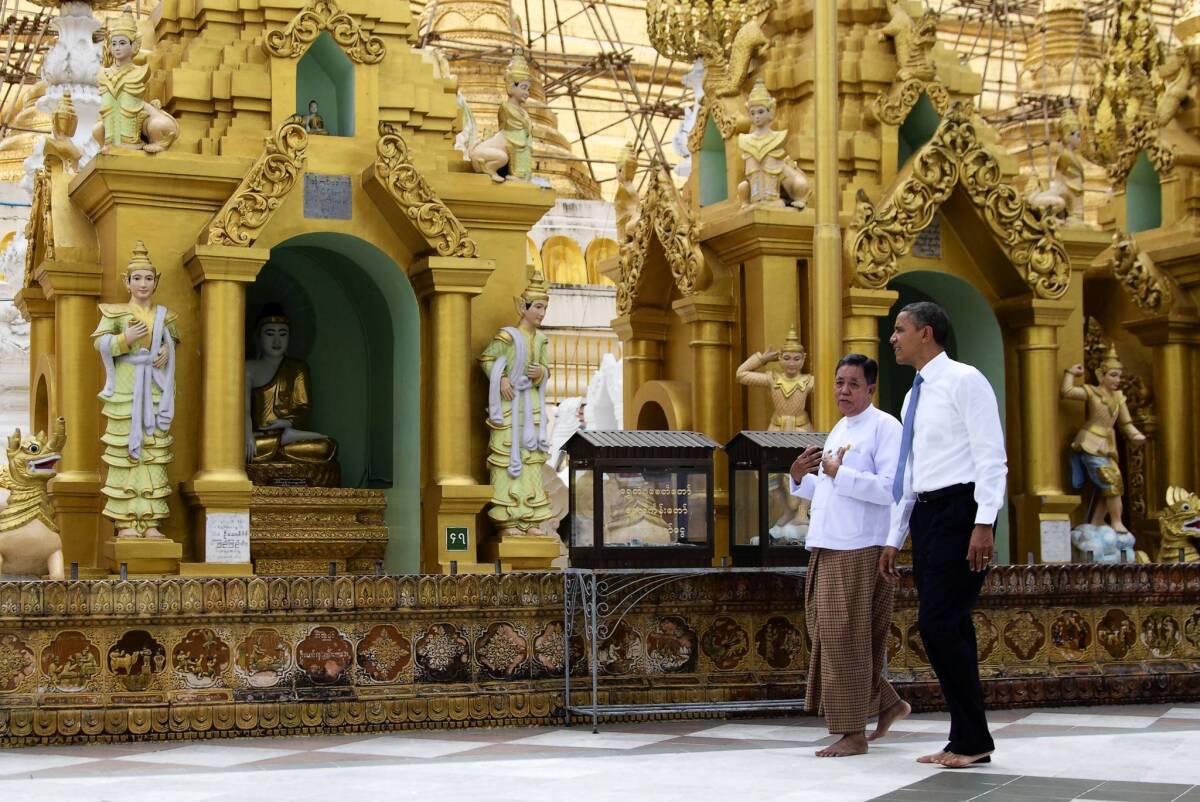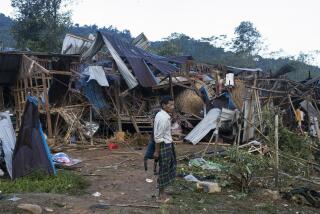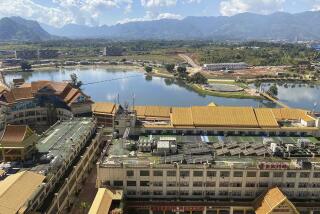Myanmar or Burma? Debate over nation’s name persists

YANGON, Myanmar — It was a subtle, but effective, way for critics to rankle the brutal generals running the country during the darkest days of global isolation: Call the nation Burma rather than Myanmar. The message: We don’t believe your rule is legitimate.
Over the years, that tug of words became highly politicized.
“Everyone gets confused with the terminology,” said Tin May Thein, executive director of Asia21 MJ Co., a Yangon consultancy. “It can make you go a bit crazy.”
Now that Myanmar is opening up to the world, easing media restrictions and freeing more political prisoners, the linguistic and political battle lines are blurring. And just as the world eventually accepted Zimbabwe for Rhodesia and Burkina Faso for Upper Volta, Myanmar will probably gain the upper hand despite the blank stares the word draws from some outsiders.
President Obama dropped a few strategic Myanmars during his November visit, to the delight of his hosts. Nearly a year earlier, his secretary of State, Hillary Rodham Clinton, avoided both names, mostly using “this country,” prompting the Reuters wire service headline, “Clinton Lauds Change in a Country With No Name.”
Such name games for this Southeast Asian nation of 54 million people continue to irk the government. “You might think this is a small matter, but the use of ‘Myanmar’ is a matter of national integrity,” Foreign Minister Wunna Maung Lwin told visiting U.S. envoy Joseph Yun last year, according to the Myanmar Times newspaper. “Using the correct name of the country shows equality and mutual respect.”
Both names have long been used in the Burmese language, and vary from a common term. Myanmar is seen as more formal or literary and Burma, more vernacular.
The first written reference to Myanmar, a term meaning fast and strong people, appears on an inscription in 1102, although the nation wasn’t unified until the British annexed the area to their Indian empire in the 19th century. The British “imperial tongue” stumbled over Myanmar and adopted Burma, reportedly similar to the name Birmania given to the country by Portuguese traders.
At independence in 1948, the country’s international name remained Burma, although in Burmese, the mother tongue of 68% of the population, it was known formally as “Myanma Naingngan” and more colloquially as “Bama pyi.” Both persist, and the national anthem still refers to “Bama pyi.”
The confusion started in 1989 when the ruling generals announced the country would henceforth be known as “Union of Myanmar.” Rangoon would be Yangon and Mandalay would become Mawlamyine, according to the decree.
In its propaganda, the government argued that Myanmar was a more inclusive term that embraced the country’s 130-plus ethnic communities, not just the majority Burmese. Its policy nonetheless “Burmanized” many place names, angering minority groups.
Another (unspoken) reason for the name change was to demonize the popular pro-democracy leader Aung San Suu Kyi, said Sein Win, chief editor with Mizzima, a publication run by exile Burmese that recently relocated to Myanmar. “It was not only a message that she was a foreign student, but also that she had a foreign husband, had a Western mentality” and was therefore a traitor.”
The United Nations, Germany, Japan and stalwart ally China quickly accepted the change. But dissidents, human rights organizations and such countries as the United States, Britain, Canada and Australia insisted on using Burma, arguing that no elected legislature had sanctioned the change. The European Union, which sat firmly on the fence, referred in documents to “Burma/Myanmar.”
Nobel laureate Suu Kyi, influential in shaping Western policies toward Myanmar, continues to use Burma in the belief that the government is still far from democratic. “I still object to it,” she told reporters recently. “So I will always refer to this country as Burma until the Burmese people decide what they want it to be called.”
She recently softened, adding in a speech that people were free to choose. But her insistence on using Burma has also spurred some ordinary Burmese to follow suit.
Last summer, while Suu Kyi was in Europe, the Myanmar government criticized her preference for Burma.
Some say the government has a point. “I think in their hearts, they feel hurt by this,” said Morten Pedersen, senior lecturer with the Australian Defense Force Academy. “I think it would be better if Suu Kyi started using Myanmar now that it’s something worth being a part of.”
One reason Burma remains popular is a practical one. “In English, it’s awkward to say ‘Myanmarese’ — grammatically, it’s totally incorrect,” said Thuta Aung, managing director of Yangon’s HamsaHub, a business development firm. “You need an adjective and the only suitable one seems like Burmese. But as a country, it’s Myanmar.”
Some diplomats still use Myanmar with government officials and Burma with Suu Kyi or foreigners, a path Obama followed during his six-hour visit. The fact he used the “M” word at all was warmly received in the capital, Naypyidaw, with Myanmar presidential advisor Ko Ko Hlaing terming its use “very positive” and an “acknowledgment of Myanmar’s government.”
Since the military stepped aside last year, Myanmar has eased media restrictions, released most political prisoners, sworn off weapons trade with North Korea and allowed Suu Kyi to run for parliament. She was elected in April.
Washington isn’t expected to swap two syllables for three as its official policy immediately, however, perhaps waiting until it’s convinced reforms are irreversible.
Amid all the hand-wringing, some question the whole debate. “Either way, your identity isn’t lost,” said U Muang Muang Thein, a poet and English teacher from Yangon. “Intellectuals think way too much about this stuff, ordinary people just accept it.”
Adds Wunna Mar Jay, a boxing promoter and board member of the Myanmar Journalists Union: “With all the other problems we have to solve, this is pretty minor. I’m 50 and I’m used to Burma. My son is 20, born during the dictatorship, and he only knows Myanmar. It’s really no problem either way.”
More to Read
Start your day right
Sign up for Essential California for news, features and recommendations from the L.A. Times and beyond in your inbox six days a week.
You may occasionally receive promotional content from the Los Angeles Times.






